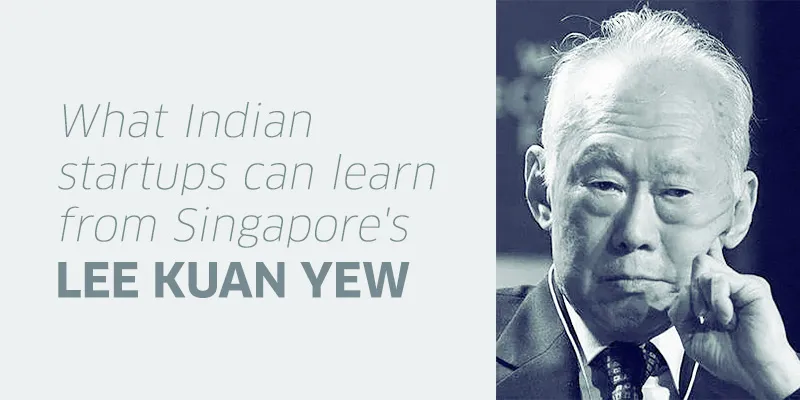What startups in India can learn from Singapore’s founder Lee Kuan Yew

Known as the founder of modern Singapore, Lee Kuan Yew, Prime Minister for three decades, had transformed the former British colony from a poor fishing hamlet into what’s now a global financial hub and economic powerhouse. Though the city-state is among the most expensive places to live in, in fact the most expensive city according to a recent report, many a talent still throng to Singapore for potential opportunities and growth.
Singapore has been among the easiest places to do business for almost a decade now, according to World Bank’s ease of doing business ranking. The country has branded itself as the gateway to South-East Asia and with giant economies like China and India in its vicinity. The government funding and assistance schemes as well as a low-tax system, legal support and good infrastructure have made it a startup-friendly city. The country continues to woo startups, invite global investors and help the set-up of incubators.
Much before its reaching out to entrepreneurs, innovation-led companies and global talent -- Singapore in the 60s has had high levels of unemployment and poverty, with many of its citizens living out of overcrowded slums. Though Singapore may lack the natural resources, the country has made good use of its strategic port. Unlike other troubled parts of Asia back then, Singapore’s port was always considered safe.
With the port well established on the world map, the city-state then focused on the manufacturing sector -- with electronics, chemicals and biotechnology product exports leading the way. Over the last couple of decades, Singapore’s focus was also on energy, infrastructure and banking. Today, Singapore’s a leader in wealth management services and considered a global financial hub.
Also what has played a major role in Singapore’s growth was its focus on the safety of its citizens. Singapore’s among the safest places for women and has a very low crime rate comparable only to the Scandinavian countries. Though one may not see many cops on the streets of Singapore, it’s sophisticated surveillance and the fear of the law has helped the country remain safe.
Most of this progress Singapore has seen can be credited to its forward-thinking leadership and its law-abiding citizens -- many of who have had to endure tough measures for the larger fruits of development.
Lee Kuan Yew has often shared his thoughts about India, sometimes critical and at other times (he understood the challenges of such a diverse region) even showed signs of admiration. Here we reflect upon some of the statesman’s India views and with an Indian startups angle:
When asked hypothetically by an Indian Administrative Officer if he could transform India like he did Singapore, the pragmatic rebel said, “No single person can change India. You speak 320 different languages.” Hence while it may be difficult to compare the two nations, having a visionary, along with a larger and more effective leadership can help make the difference.
In the Indian innovation-led startups space, there are many entrepreneurs and innovators who have been doing all they can to solve challenges and explore opportunities. If we can all fit into a long-term vision, join the collective leadership and implement plans – each of us may well be on the path to success. The ability to collaborate with communities is increasingly becoming a must-have for businesses.
During the same convention, Lee Kuan Yew, also suggested three rules for good governance:
1) Integrity and absence of corruption.
2) Meritocracy - best people for the best jobs.
3) A fair level-playing field for everybody.
If you look at these rules, if we percolate personal integrity amongst ourselves and our emotional extensions -- corruption and dishonesty can be quelled leading to a more level-playing field.
On the other hand, in one of his interviews he also had this to say of the average Indian civil servant and administrator. He felt they saw themselves more as regulators and not as facilitators. And that some of these bureaucrats viewed Indian business people as money-grabbing opportunists who do not have the welfare of the country at heart.
It takes a lot of effort to build trust and credibility, not just with administrators but when reaching out to potential customers too. The whole thing is complicated when mishaps in a diverse nation of a billion plus get amplified and not so much solved.
Nevertheless, a useful attribute we seem to have managed to gain in all noise is, well, an increase in communication. Our communication options have helped us identify challenges, take stands, hear perspectives (at least some) and generally accept critical feedback.
This communication learning, especially from the ICT startups space in India, is something I’d be sharing during the upcoming Global Crowdsourcing Week event in Singapore. Along with some communication traits from diverse India, I’d also be exploring other community attributes such as collaboration and building trust, along with the thought-leaders present at the conference. YourStory will be there to cover the event closely.
Concluding, I’d end with another line of Lee Kuan Yew’s, who said, “India must make up for much time lost.” As entrepreneurs and change-makers in India, many of us do understand this urgency and see the massive potential ahead. Our ability to quickly find and solve challenges, besides developing qualities such as being collaborative, communicative and credible in our approach may be our best tribute to this global leader’s vision of bettering lives.







